HERBERT
SNOWDEN FINDLATER and his Descendants
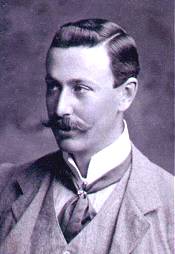 Herbert Snowden Findlater
was educated at Strangeways School and Trinity College Dublin. He took articles
with William Findlater & Co, Solicitors in Dame Street, the firm founded
by Sir William Findlater. He then put up his own plate and shared chambers with
the Taxing Master, later joining the firm of Hoey and Denning, Trinity Street.
Herbert Snowden Findlater
was educated at Strangeways School and Trinity College Dublin. He took articles
with William Findlater & Co, Solicitors in Dame Street, the firm founded
by Sir William Findlater. He then put up his own plate and shared chambers with
the Taxing Master, later joining the firm of Hoey and Denning, Trinity Street.
Herbert and Evelyn enjoyed
a gay social round and were ardent members of the Kingstown Gilbert & Sullivan
Society. A photograph exists of Herbert as Sir Marmaduke in the Sorcerer in
1898. Dressed in wig, cut back military jacket and knee breeches, he shows a
well-turned leg and handsome demeanour. Miss Dolly Byrne as Lady Sangazure clearly
has no trouble with him. He was also a keen member of the Royal Alfred Yacht
Club and sailed his boat, the Challenge, in Dublin Bay. His brother Charlie
made a model of it for his son Max to sail and this is still in my possession.
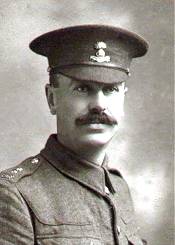 He
was also a keen footballer, being a member of the Monkstown Football Club. It
was through this that in 1914 he joined the ‘Rugby Football Company’,
for along with most of the young professional men in Dublin, he and his brother
Charles enrolled in the ‘Pals’, D Company of the 7th Royal Dublin
Fusiliers. They were sent to Gallipoli, and he went missing, presumed dead,
on Chocolate Hill, Suvla Bay on 16th August 1915.
He
was also a keen footballer, being a member of the Monkstown Football Club. It
was through this that in 1914 he joined the ‘Rugby Football Company’,
for along with most of the young professional men in Dublin, he and his brother
Charles enrolled in the ‘Pals’, D Company of the 7th Royal Dublin
Fusiliers. They were sent to Gallipoli, and he went missing, presumed dead,
on Chocolate Hill, Suvla Bay on 16th August 1915.
Because Herbert and Evelyn
had enjoyed a high standard of living, without having built up any significant
capital, the family were left in a very poor way. If Herbert had had time to
build up a big practice, of course, things would have been very different. When
Herbert Snowden was posted missing, Evelyn being herself English, returned to
Cheshire, with her two sons and her mother who had originally come from that
area. Evelyn received an allowance from her mother-in-law and benefited under
her will, but the sums involved were not great.
Evelyn died of a heart attack
in the street in Liverpool in 1937. According to her wishes Max scattered her
ashes in the Irish Sea, so that she was buried between her two homes.
 She
was a firm character and always very well turned out. Marjorie Mitchell remembers
that before the First World War Herbert and Evelyn kept a good house and gave
a beautiful party for her coming out in 1913 and that even after Herbert's death,
whenever Evelyn returned to Dublin, she always had the best quality clothes
and well-matched accessories despite her poverty. This poverty must have been
relative at least in later years, for she had a car when such machines were
a comparative rarity.
She
was a firm character and always very well turned out. Marjorie Mitchell remembers
that before the First World War Herbert and Evelyn kept a good house and gave
a beautiful party for her coming out in 1913 and that even after Herbert's death,
whenever Evelyn returned to Dublin, she always had the best quality clothes
and well-matched accessories despite her poverty. This poverty must have been
relative at least in later years, for she had a car when such machines were
a comparative rarity.
The Thompsons were a North
Yorkshire family. Evelyn's father Frederick had been the youngest of five brothers
and had moved to Cheshire with his brothers John and Charles. John Thompson
was a much respected member of Chester society, a founder member and chairman
of the Dee Oil Company. From 1856 to 1878, Frederick and Charles had the lease
of a farm and coal mine in Harwarden from William Ewart Gladstone. They also
went into business as brickmakers although that appears not have been successful.
Frederick married Mary Eliza,
daughter of Dr Moffat. They moved to Dublin where she met her husband. The Maxwell
Moffats were an old Scots family and she could remember being taken to Dumfries
from whence her father came to hear her cousin’s claim to the Maxwell earldom
of Nithsdale be adjudged. This cousin and his brother died childless and so
the Maxwell name has descended to the Findlaters, Evelyn bearing the name and
passing it on to her son, grandson and great-grandchildren.
Frederick Thompson and Mary
Eliza Maxwell Moffat, his wife, had an elder daughter Minnie and one son Gordon,
who became a doctor, but both died comparatively young. Gordon married, but
he had no children, so although Evelyn was therefore the only surviving child,
it brought no money to her, for Frederick had been bankrupted.
MAXWELL of STROQUHAN
Evelyn was descended from
the Dumfriesshire family of Maxwell Moffat of Stroquhan. They are part of the
great border Maxwell family, headed until attainted after the 1715 rising by
the Earl of Nithsdale, who was also Lord Maxwell and Chief of the Maxwells.
There is an interesting story about Edward Maxwell, who was the son of Stroquhan
in 1715. Maxwell of Stroquhan was a cousin of Lord Nithsdale, who joined the
rebellion at Moffat, very late, having missed the gathering at Aboyne. At his
trial for treason, Nithsdale said that he joined with four personal servants
only. As the younger of Stroquhan would at this time have been in his teens,
I think that he might have gone as a sort of page, although I see from accounts
of the prisoners that a number of the Maxwell gentry were involved. It was not
uncommon for a son to follow the Pretender, while the father kept the family
estate warm, so that they could bend with the wind.
The story goes that "
He was a very strong man. A court martial was being held in a large barn near
Preston for the trying of prisoners of lesser degree. When Stroquhan was being
marched up to the barn he noticed several horses tethered together a few yards
from the entrance, and one horse particularly attracted his attention from its
fine appearance. He was preceded by a soldier, followed by another, and had
one on each side of him all close together. After advancing a few steps, he
suddenly seized both the soldiers on each side of him by their necks and knocked
their heads together, at the same time kicking out behind, he struck the other
soldier in the stomach and so floored all three. The soldier in front tumbled
over those already on the floor. So he had a good start for the horses, and
whipping out his knife he cut the rope which tethered the horse, jumped on its
back and was well off before the alarm could be raised.
"He took to the open
country between Preston and Fleetwood where he was sharply followed by a number
of troopers. His horse being a good one kept well ahead and the pistol shots
fortunately fell wide. He at last came to a bend in the stream, broader than
usual. If he did not cross, he would be taken, as the troopers were pressing
behind and on each side of him and there was no other way of escape. Encouraging
his horse, he put him to the jump and cleared the stream. None of the troopers
would attempt it and as it was more than a mile round to any other crossing,
he got clear away and soon found a hiding place amongst the gentry of North
Lancashire who were all favourable to Prince James and of the Roman religion.
Ultimately he escaped and joined Rob Roy." Gilbert Maxwell of Stroquhan,
his father, was a trader in black cattle, so would have known MacGregor. Sir
Walter Scott had a dagger and purse which had been given to Maxwell of Stroquhan
by Rob Roy MacGregor; these are still at Abbotsford.
Edward Maxwell married the
daughter of John Kennedy of Bankend, who was a Quaker. Kennedy of Bankend was
a cadet of Kennedy of Auchtyfardle, although wealthier, having acquired Bankend
by marriage with a Symington heiress. Grizell Kennedy of Bankend was orphaned
in 1715 aged four by her father’s death. In June 1716 her uncle Gilbert
Maxwell of Stroquhan was appointed her tutor (guardian) and it was not until
1721 that she eloped with his son Edward, when she was 10 and Edward was probably
in his early 20’s.
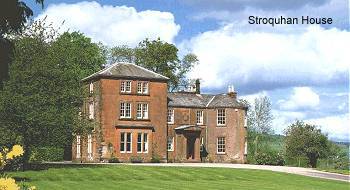 On
her father’s death, she had been settled in a school in Lanark, but Gilbert,
her tutor, removed her in June 1718 and kept her at Stroquhan, allegedly without
any suitable education or aliment. In 1721 the couple took two horses from Stroquhan
and together with two of Gilbert’s drovers, who were presumably to act
as witnesses, crossed the border into England and were there married. That the
marriage was valid must be true as it was only impugned by the Kennedies on
grounds of Grizzel’s age and they would certainly have attacked it on any
ground available. After a week or so the couple returned as man and wife.
On
her father’s death, she had been settled in a school in Lanark, but Gilbert,
her tutor, removed her in June 1718 and kept her at Stroquhan, allegedly without
any suitable education or aliment. In 1721 the couple took two horses from Stroquhan
and together with two of Gilbert’s drovers, who were presumably to act
as witnesses, crossed the border into England and were there married. That the
marriage was valid must be true as it was only impugned by the Kennedies on
grounds of Grizzel’s age and they would certainly have attacked it on any
ground available. After a week or so the couple returned as man and wife.
The Kennedys objected in
the Court of Session and the plaint is signed by a large number of uncles and
cousins, including those of the Auchtyfardle family. The Maxwells kept her out
of the way until she was 12 and Gilbert spent most of 1722 in the Edinburgh
Tolbooth, so she must have been a worthwhile catch. It seems that Gilbert’s
wife, Mary McMin, was sympathetic, if not the moving force behind the scenes.
In March 1723, a reward of £50 was offered in the Edinburgh Courant for
the arrest of Grizzell Kennedy, or £100, if found in England. By now the
couple were hiding with friends in the depths of Galloway. By the end of 1723,
the Court lost patience and sentenced Gilbert to six month’s imprisonment
and a fine of £150 sterling for attempting to hinder justice, but the
marriage was allowed to stand as Grizzell was ‘viri potens’.
By now it was safe for the
couple to surrender themselves to the Court. Grizzell asserted that she was
the initiator, "I will explain it all, my Lord, in a few words. I was out
riding in the afternoon, unattended, when I happened to meet the younger of
Stroquhan on the road. We walked and talked together, then I said, ‘get
up behind,’ and I rode away with him and did not stop until long after
dark and in a strange country, so what could he do but marry me?" The Judge,
looking from one to the other, said to the lady, "You look like it. I quite
believe you. You were wrong to do so, but under the circumstances, as the marriage
is suitable, I will impose no penalty." Clearly a lady of some personality.
It is noteworthy that Edward
and Grizel eloped in 1721, but their son Edward was not born until 1727. However
he was the only son living in 1732 when Grizel, now 21, disponed of the Bankend
lands, as this is specifically stated in the deed. It would however be consistent
with her not being of child-bearing age until she was 16. The other curiosity
is that there was a gap until 1737 when the other three children were born.
HERBERT MAXWELL FINDLATER,
ERD, MA, FRGS
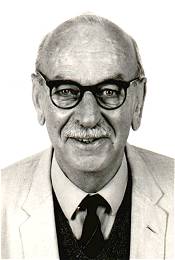
Herbert Maxwell Findlater
was born on 25th February 1905 at Sunnyside, Glenageary, Kingstown, Co Dublin,
the elder son of Herbert Snowden by his English/Scottish wife Evelyn Maxwell
Thompson. He married Mary Barbara Dawson on 3rd April 1948 in the chapel of
the Nautical College Pangbourne and died on holiday at Barnstaple on 9th April
1977. They had two children, Alexander John Maxwell Findlater, born 28th January
1951 and Helen Mary, born 15th August 1953.
When Herbert Snowden Findlater
was posted missing in 1915, Evelyn returned to Cheshire, with her mother who
had come from that area. Herbert Maxwell Findlater was educated at Birkenhead
School and Liverpool College, taking a Kitchener Scholarship to Sidney Sussex
College Cambridge, where he read History and Geography. Failing the Army entrance
on his eyesight, he taught initially at Liverpool College, then, much to his
mother's distress, at Cranbrook in Kent finally moving in 1934 to the Nautical
College Pangbourne. He joined the Army Reserve in March 1935 and was mobilised
at the beginning of the war. He served in France, Africa and Italy, as well
as in London. He was eligible thus for the Army Reserve Decoration (ERD).
Having met his wife Mollie
at a wedding before the war, he had left his signet ring for her, in the event
that he did not return. Shortly before the war, he had bought the Glebe Cottage,
Bucklebury, Berks, which was only sold after her death in 1994, thus remaining
the family home for fifty-five years. Both children were born there, but there
was a period from 1955 to 1963 when they lived at Pangbourne, as he was a housemaster.
He was head of Geography and Second Master. He did consider taking a headship
in the late 50s, but this did not happen, possibly because he valued his life
as it was too highly, but certainly because he lacked that hard streak of ambition
which is needed to succeed in the outside world. After retiring in 1967, he
spent more time on voluntary activities, the Conservative Party, the Newbury
Arts Festival (not a success), and the Council for the Protection of Rural England.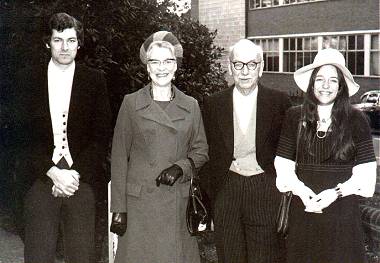
He suffered from circulatory
disease and had a number of operations on the arteries in his legs. He died
of a heart attack while spending Easter in Bideford, North Devon with his family.
He had no love of money, but based his life entirely around his family and especially
his wife Mollie. His character was straight and his code of conduct strict,
but this was tempered by a deep understanding of the human mind and by an infectious
sense of humour, exemplified by his fund of Irish stories.
The son
Alex is married to Hattie Hyde Parker and has two daughters Frederica and
Leonora, the daughter Helen, who is a teacher like her father, married John
Keelty, who is a senior Inspector of Taxes. They have two children, Catherine
(b 1984) and Christopher (b 1985). Thus are the brief details.
JOHN GODFREY FINDLATER
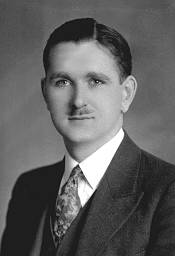 The
second son of Herbert Snowden and Evelyn Maxwell Findlater, John Godfrey, was
born on 29th March 1908. He had the same upbringing as his brother, but left
for Canada at the age of 17. He married Helen Dumbrille on 26th December 1930.
The
second son of Herbert Snowden and Evelyn Maxwell Findlater, John Godfrey, was
born on 29th March 1908. He had the same upbringing as his brother, but left
for Canada at the age of 17. He married Helen Dumbrille on 26th December 1930.
John attended Kemptville
Agricultural College when he first arrived in Canada, but as it did not suit
he moved to work for Eaton’s, a department store group. This was interrupted
by war service with the RCAF until 1946. The story is that when in England,
he went to Bucklebury and approached his brother with the words, "If you’re
Max Findlater, then I’m your brother." A good line. He subsequently
bought a village store, for a love of the simple life, which Helen did not altogether
share, although the daughters loved it. He was called up for further military
service in 1953 and discharged in 1956, when he took Holy Orders. His last parish
was the Church of the Redeemer in Kingston, where he died after lunch on 29th
January 1980, having administered 21 bedside communions that morning.
He had two daughters, Barbara,
born1936 and Sheila, born 1938. Barbara lives in Scarboro, Toronto, with her
husband Stan Taggart and has a son John and a daughter Elizabeth (Biz), who
both have children. Sheila lives in Kingston, Ontario with her husband Danny
McLeod. By her first marriage to Allan Derrick, she has three children Debbie,
Donna and Doug. All three have children, but Donna died in 1997 from cancer.
written by Alexander
John Maxwell Findlater
Return
to the Morayshire Branch
 Herbert Snowden Findlater
was educated at Strangeways School and Trinity College Dublin. He took articles
with William Findlater & Co, Solicitors in Dame Street, the firm founded
by Sir William Findlater. He then put up his own plate and shared chambers with
the Taxing Master, later joining the firm of Hoey and Denning, Trinity Street.
Herbert Snowden Findlater
was educated at Strangeways School and Trinity College Dublin. He took articles
with William Findlater & Co, Solicitors in Dame Street, the firm founded
by Sir William Findlater. He then put up his own plate and shared chambers with
the Taxing Master, later joining the firm of Hoey and Denning, Trinity Street.  He
was also a keen footballer, being a member of the Monkstown Football Club. It
was through this that in 1914 he joined the ‘Rugby Football Company’,
for along with most of the young professional men in Dublin, he and his brother
Charles enrolled in the ‘Pals’, D Company of the 7th Royal Dublin
Fusiliers. They were sent to Gallipoli, and he went missing, presumed dead,
on Chocolate Hill, Suvla Bay on 16th August 1915.
He
was also a keen footballer, being a member of the Monkstown Football Club. It
was through this that in 1914 he joined the ‘Rugby Football Company’,
for along with most of the young professional men in Dublin, he and his brother
Charles enrolled in the ‘Pals’, D Company of the 7th Royal Dublin
Fusiliers. They were sent to Gallipoli, and he went missing, presumed dead,
on Chocolate Hill, Suvla Bay on 16th August 1915. She
was a firm character and always very well turned out. Marjorie Mitchell remembers
that before the First World War Herbert and Evelyn kept a good house and gave
a beautiful party for her coming out in 1913 and that even after Herbert's death,
whenever Evelyn returned to Dublin, she always had the best quality clothes
and well-matched accessories despite her poverty. This poverty must have been
relative at least in later years, for she had a car when such machines were
a comparative rarity.
She
was a firm character and always very well turned out. Marjorie Mitchell remembers
that before the First World War Herbert and Evelyn kept a good house and gave
a beautiful party for her coming out in 1913 and that even after Herbert's death,
whenever Evelyn returned to Dublin, she always had the best quality clothes
and well-matched accessories despite her poverty. This poverty must have been
relative at least in later years, for she had a car when such machines were
a comparative rarity. On
her father’s death, she had been settled in a school in Lanark, but Gilbert,
her tutor, removed her in June 1718 and kept her at Stroquhan, allegedly without
any suitable education or aliment. In 1721 the couple took two horses from Stroquhan
and together with two of Gilbert’s drovers, who were presumably to act
as witnesses, crossed the border into England and were there married. That the
marriage was valid must be true as it was only impugned by the Kennedies on
grounds of Grizzel’s age and they would certainly have attacked it on any
ground available. After a week or so the couple returned as man and wife.
On
her father’s death, she had been settled in a school in Lanark, but Gilbert,
her tutor, removed her in June 1718 and kept her at Stroquhan, allegedly without
any suitable education or aliment. In 1721 the couple took two horses from Stroquhan
and together with two of Gilbert’s drovers, who were presumably to act
as witnesses, crossed the border into England and were there married. That the
marriage was valid must be true as it was only impugned by the Kennedies on
grounds of Grizzel’s age and they would certainly have attacked it on any
ground available. After a week or so the couple returned as man and wife.

 The
second son of Herbert Snowden and Evelyn Maxwell Findlater, John Godfrey, was
born on 29th March 1908. He had the same upbringing as his brother, but left
for Canada at the age of 17. He married Helen Dumbrille on 26th December 1930.
The
second son of Herbert Snowden and Evelyn Maxwell Findlater, John Godfrey, was
born on 29th March 1908. He had the same upbringing as his brother, but left
for Canada at the age of 17. He married Helen Dumbrille on 26th December 1930.